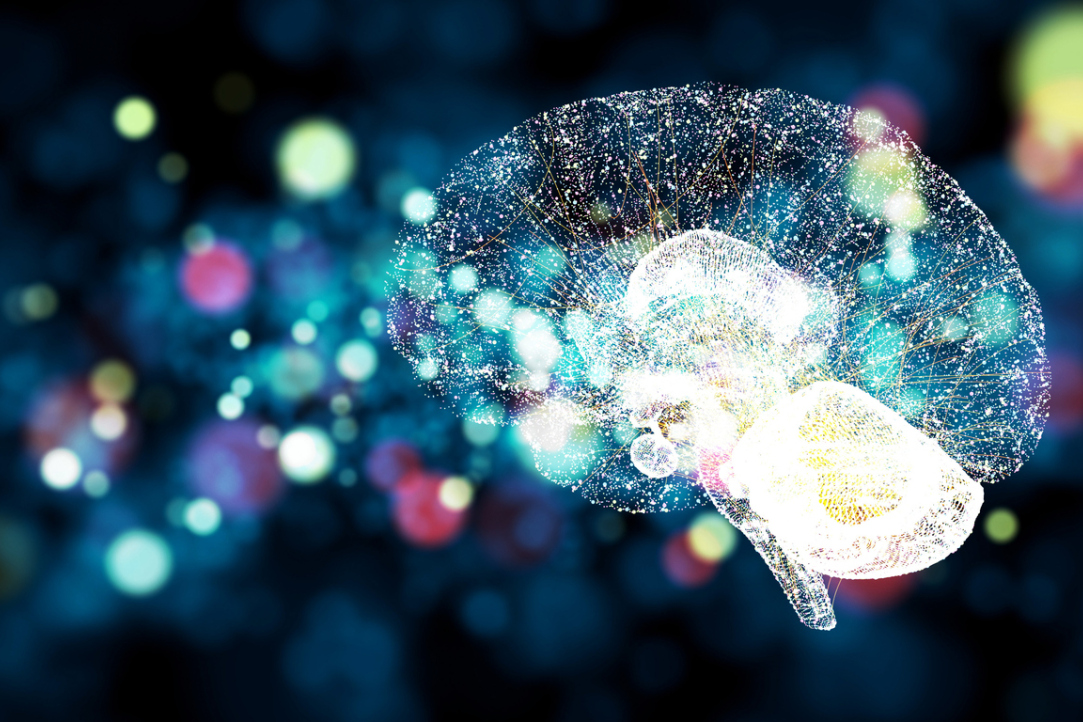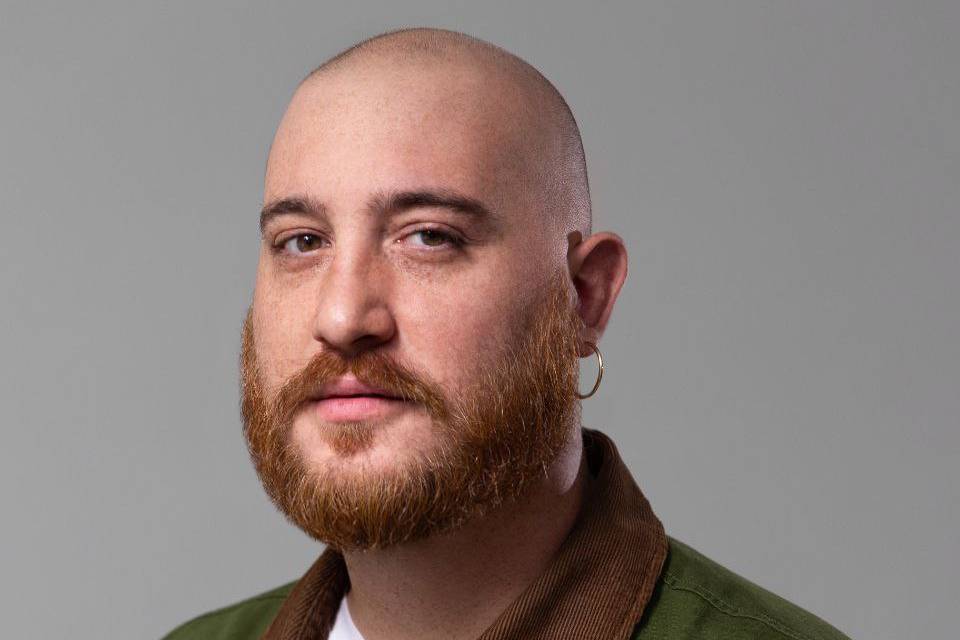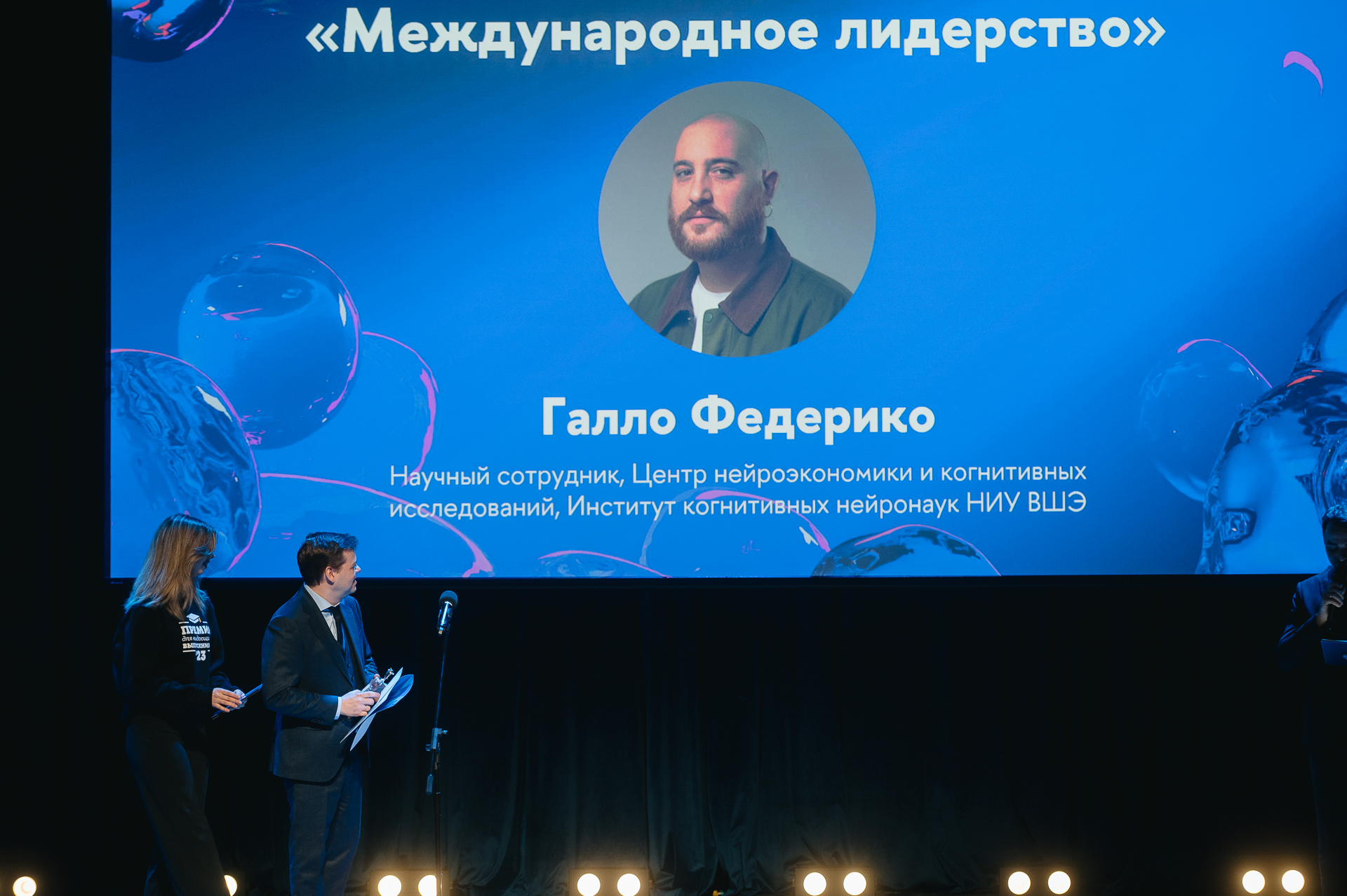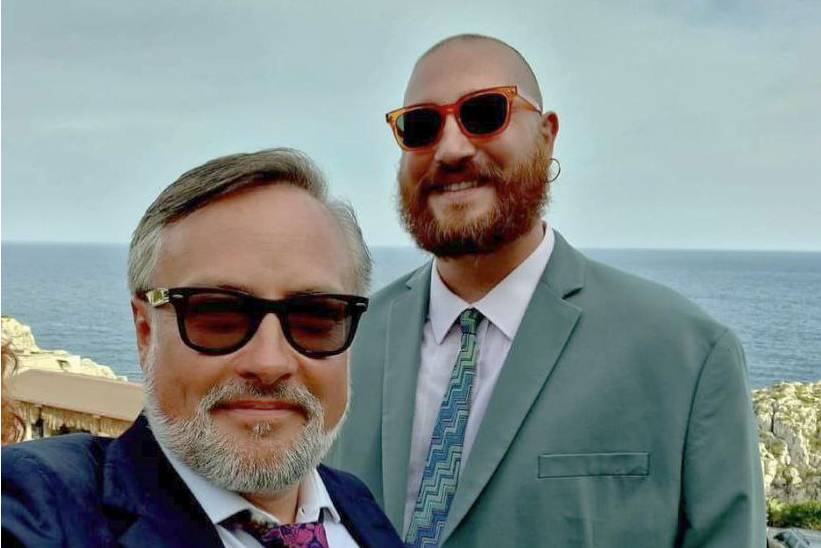‘Scientists Work to Make This World a Better Place’

Federico Gallo is a Research Fellow at the Centre for Cognition and Decision Making of the HSE Institute for Cognitive Research. In 2023, he won the Award for Special Achievements in Career and Public Life Among Foreign Alumni of HSE University. In this interview, Federico discusses how he entered science and why he chose to stay, and shares a secret to effective protection against cognitive decline in old age.

Beginning of the journey: from ancient Greek to neuroscience
Since childhood, I have been passionate about books, particularly those on science, history, and the English language. I attended a Classical Studies high school, where I studied ancient Greek and Latin, as well as antiquities. I was a curious child, and was fortunate to have family and friends who always supported my inquisitive, exploratory nature. I always knew I wanted to be a researcher but did not know in what field.
Initially, I took up Physics in university, as I wanted to be an astrophysicist. However, I soon realised I loved the mathematics-oriented subjects more and thought of changing my path. I shared my doubts with my mother, a high school teacher, and she, knowing of my interest in psychology since high school, suggested that I might look into a new topic: neuroscience. At the time, neuroscience was quite new as a field of research. I was drawn to it because it integrated multiple fields of knowledge, combining psychology with a rigorous scientific approach. I still believe that interdisciplinarity is the most wonderful and strongest aspect of neuroscience.
In 2011, I enrolled in University Vita-Salute San Raffaele in Milan. My first course was with Prof. Andrea Moro, a direct student of Noam Chomsky—one of the most impactful intellectuals of the 20th century who has influenced the establishment of cognitive sciences worldwide. Andrea’s approach to science fascinated me even more than the subject itself. When it came time for me to write my thesis, I wanted him to be my academic supervisor. However, Andrea had just been appointed to an important new role and would not have had the time to follow my work properly. Thus, he referred me to 'a brilliant colleague of his,' Prof. Jubin Abutalebi.
Jubin’s research focused on bilingualism. I booked an appointment with him, but shortly before our official meeting, I unexpectedly ran into him in the university corridors. He already knew that I was going to write my thesis with him and immediately asked which age group I was interested in. I was caught a bit off-guard because I hadn't considered it yet, and gave the most honest answer I could, saying I wanted to study seniors since the entire world is aging. Unbeknownst to me then, those were the years in which the relationship between bilingualism and aging was starting to be researched.
The next morning, I was already at Jubin's laboratory. My collaboration and close friendship with him continue to this day, and the relationship between bilingualism and aging has become my primary research focus.
While all the knowledge I gained in school and university helped shape me into the person I am today, none of it has been specifically crucial to my scientific career. Finding the right people in my life has played a key role. I have been very fortunate that my academic supervisors, family, friends, and my girlfriend Lisa have always provided me with unfailing support.
About working in Russia: 'Being at HSE University, you do your science and you don’t even notice whether you are working in Russia, Italy, or the Philippines'
Jubin has a good friend and esteemed colleague, Prof. Andriy Myachykov, Leading Research Fellow at the HSE Institute of Cognitive Neuroscience. Together with another colleague from HSE University, Prof. Yury Shtyrov, they invited me to become the link for an international collaboration between Milan and Moscow. I felt humbled and flattered by the fact that Andriy even took a trip to Milan to get to know me, months before the applications for the doctoral programme opened. I applied to and won a governmental scholarship as well as the HSE scholarship for advanced doctoral studies and moved to Moscow to study at the Doctoral School of Cognitive Sciences. After I got notified of my acceptance to HSE University and was heading to Russia, I was proposed to take up a prestigious Marie Curie PhD scholarship in Barcelona. However, I was so inspired by the collaboration with my soon-to-be new supervisors that the thought of changing my decision did not even cross my mind.

I recall the years of my doctoral studies with great warmth and gratitude. I conducted my research at the Centre for Cognition and Decision Making, which is now part of the Institute for Cognitive Neuroscience. What empowered me the most was the trust my senior colleagues placed in a young scientist like me at that time. It made me feel independent as a researcher, while knowing I could always count on the attention and support of my supervisors. This experience enabled me to become a truly mature and independent researcher. I would like to take this opportunity to thank my supervisors Andriy Myachykov and Yury Shtyrov, and the directorate of the Institute, Victoria Moiseeva and Anna Shestakova, for always believing in me.
The Institute for Cognitive Neuroscience became like a family to me, and I never felt like a foreigner placed in the Russian academic environment. Thanks to the means provided by HSE University, you do your science and you don’t even notice whether you are working in Russia, Italy, or the Philippines.
After my doctoral studies, I was hired as a postdoc at the Institute. Today, I am probably one of the longest-standing employees at the Institute for Cognitive Neuroscience. I was recently awarded a highly prestigious Marie Sklodowska Curie Postdoctoral Fellowship and had to leave Russia for some time. But I continue to work on my projects remotely and I am currently supervising several master’s and PhD students. I have seen from my own experience how people's reactions change when you are confident and openly express your passions and aspirations. It invites support, respect, and even fascination. Therefore, I consider it my personal mission to empower and support younger researchers, giving them the opportunity to take pride in their work.

About modern neuroscience, bilingualism and aging: 'I might have to share an unpleasant fact: brain aging can begin as early as 20 to 25 years old!'
I consider cognitive aging to be my primary research focus. I investigate how various lifestyle factors can mitigate or delay the cognitive effects of aging. I might have to share an unpleasant fact: brain aging can begin as early as 20 to 25 years old, therefore it is crucial for societies to know where to invest to support successful cognitive aging.
Bilingualism is one of the most powerful life experiences for mitigating cognitive aging. Bilingualism does not necessarily imply knowing two languages from birth; our field defines it as having at least some level of proficiency in a second language. Even if you start learning a foreign language as an adult, you can still become bilingual and increase your brain's cognitive reserve.
Cognitive reserve is like a bankaccount in our brains that we replenish throughout our lives through cognitively challenging life experiences as education, social interactions, and physical activity. In older age, when the brain requires additional resources to carry out its usual functions, it gradually begins to draw from this reserve. If you have built a substantial reserve over your lifetime, your brain will be able to draw on it for a long time and function normally despite age-related changes.
Our recent research has shown that not only learning a second language, but also the linguistic distance between a bilingual's two languages can influence brain function in old age. It appears that languages that are similar, such as Spanish and Portuguese, are more beneficial for the brain in the long run than languages that are distant, with radically different grammatical and lexical-semantic structures. When we start learning a new language, we effectively exercise our brains by training them to switch between different language systems without confusing them. With more distant language pairs, maximum effort is required during the learning stage. However, after a while, learners can easily separate their native and foreign languages and avoid any confusion. With closer language pairs, although the learning phase is much easier, the brain must maintain a higher level of language control to avoid mixing up the two systems. This means that when a Russian speaker begins learning Chinese, their brain works extremely hard at first, but once they achieve fluency, it can relax and become less active. In contrast, with the Russian and Belarusian language pair, the brain must always remain alert. Therefore, to mitigate cognitive decline in old age, learning similar languages may be more beneficial.
About the future and selflessness of scientists
My colleagues and I are currently working on a large-scale project: a meta-analysis comparing all lifestyle factors in terms of their positive contributions to successful aging. I may be biased, but I believe the main priority for science should be to develop solutions for aging-related neurodegenerative diseases, particularly Alzheimer's Disease, the incidence of which is increasing annually. What is needed first is a better understanding of its pathogenesis, followed by the development of reliable pharmacological solutions. While we wait for these developments, bilingualism is one of the most significant and notably cost-effective tools governments can use to prevent/mitigate the problem of cognitive decline in old age.
It is essential for me, as a scientist, to feel that our discoveries and results are contributing to making this world a better place. In my opinion, a scientist's main goal should be the desire to improve the world. It's unfortunate that many people are forgetting about this.
In a sense, I consider myself an idealist. Science should not pursue selfish commercial objectives. Selflessness is its crucial component. I hope that I will leave this world a better place than I found it.
See also:
HSE Researchers Discover Simple and Reliable Way to Understand How People Perceive Taste
A team of scientists from the HSE Centre for Cognition & Decision Making has studied how food flavours affect brain activity, facial muscles, and emotions. Using near-infrared spectroscopy (fNIRS), they demonstrated that pleasant food activates brain areas associated with positive emotions, while neutral food stimulates regions linked to negative emotions and avoidance. This approach offers a simpler way to predict the market success of products and study eating disorders. The study was published in the journal Food Quality and Preference.
HSE Neurolinguists Create Russian Adaptation of Classic Verbal Memory Test
Researchers at the HSE Centre for Language and Brain and Psychiatric Hospital No. 1 Named after N.A. Alexeev have developed a Russian-language adaptation of the Rey Auditory Verbal Learning Test. This classic neuropsychological test evaluates various aspects of auditory verbal memory in adults and is widely used in both clinical diagnostics and research. The study findings have been published in The Clinical Neuropsychologist.
Researchers at HSE Centre for Language and Brain Reveal Key Factors Determining Language Recovery in Patients After Brain Tumour Resection
Alina Minnigulova and Maria Khudyakova at the HSE Centre for Language and Brain have presented the latest research findings on the linguistic and neural mechanisms of language impairments and their progression in patients following neurosurgery. The scientists shared insights gained from over five years of research on the dynamics of language impairment and recovery.
Neuroscientists Reveal Anna Karenina Principle in Brain's Response to Persuasion
A team of researchers at HSE University investigated the neural mechanisms involved in how the brain processes persuasive messages. Using functional MRI, the researchers recorded how the participants' brains reacted to expert arguments about the harmful health effects of sugar consumption. The findings revealed that all unpersuaded individuals' brains responded to the messages in a similar manner, whereas each persuaded individual produced a unique neural response. This suggests that successful persuasive messages influence opinions in a highly individual manner, appearing to find a unique key to each person's brain. The study findings have been published in PNAS.
'We Are Creating the Medicine of the Future'
Dr Gerwin Schalk is a professor at Fudan University in Shanghai and a partner of the HSE Centre for Language and Brain within the framework of the strategic project 'Human Brain Resilience.' Dr Schalk is known as the creator of BCI2000, a non-commercial general-purpose brain-computer interface system. In this interview, he discusses modern neural interfaces, methods for post-stroke rehabilitation, a novel approach to neurosurgery, and shares his vision for the future of neurotechnology.
Smoking Habit Affects Response to False Feedback
A team of scientists at HSE University, in collaboration with the Institute of Higher Nervous Activity and Neurophysiology of the Russian Academy of Sciences, studied how people respond to deception when under stress and cognitive load. The study revealed that smoking habits interfere with performance on cognitive tasks involving memory and attention and impairs a person’s ability to detect deception. The study findings have been published in Frontiers in Neuroscience.
'Neurotechnologies Are Already Helping Individuals with Language Disorders'
On November 4-6, as part of Inventing the Future International Symposium hosted by the National Centre RUSSIA, the HSE Centre for Language and Brain facilitated a discussion titled 'Evolution of the Brain: How Does the World Change Us?' Researchers from the country's leading universities, along with health professionals and neuroscience popularisers, discussed specific aspects of human brain function.
'Science Is Akin to Creativity, as It Requires Constantly Generating Ideas'
Olga Buivolova investigates post-stroke language impairments and aims to ensure that scientific breakthroughs reach those who need them. In this interview with the HSE Young Scientists project, she spoke about the unique Russian Aphasia Test and helping people with aphasia, and about her place of power in Skhodnensky district.
Neuroscientists from HSE University Learn to Predict Human Behaviour by Their Facial Expressions
Researchers at the Institute for Cognitive Neuroscience at HSE University are using automatic emotion recognition technologies to study charitable behaviour. In an experiment, scientists presented 45 participants with photographs of dogs in need and invited them to make donations to support these animals. Emotional reactions to the images were determined through facial activity using the FaceReader program. It turned out that the stronger the participants felt sadness and anger, the more money they were willing to donate to charity funds, regardless of their personal financial well-being. The study was published in the journal Heliyon.
Spelling Sensitivity in Russian Speakers Develops by Early Adolescence
Scientists at the RAS Institute of Higher Nervous Activity and Neurophysiology and HSE University have uncovered how the foundations of literacy develop in the brain. To achieve this, they compared error recognition processes across three age groups: children aged 8 to 10, early adolescents aged 11 to 14, and adults. The experiment revealed that a child's sensitivity to spelling errors first emerges in primary school and continues to develop well into the teenage years, at least until age 14. Before that age, children are less adept at recognising misspelled words compared to older teenagers and adults. The study findings have beenpublished in Scientific Reports .


